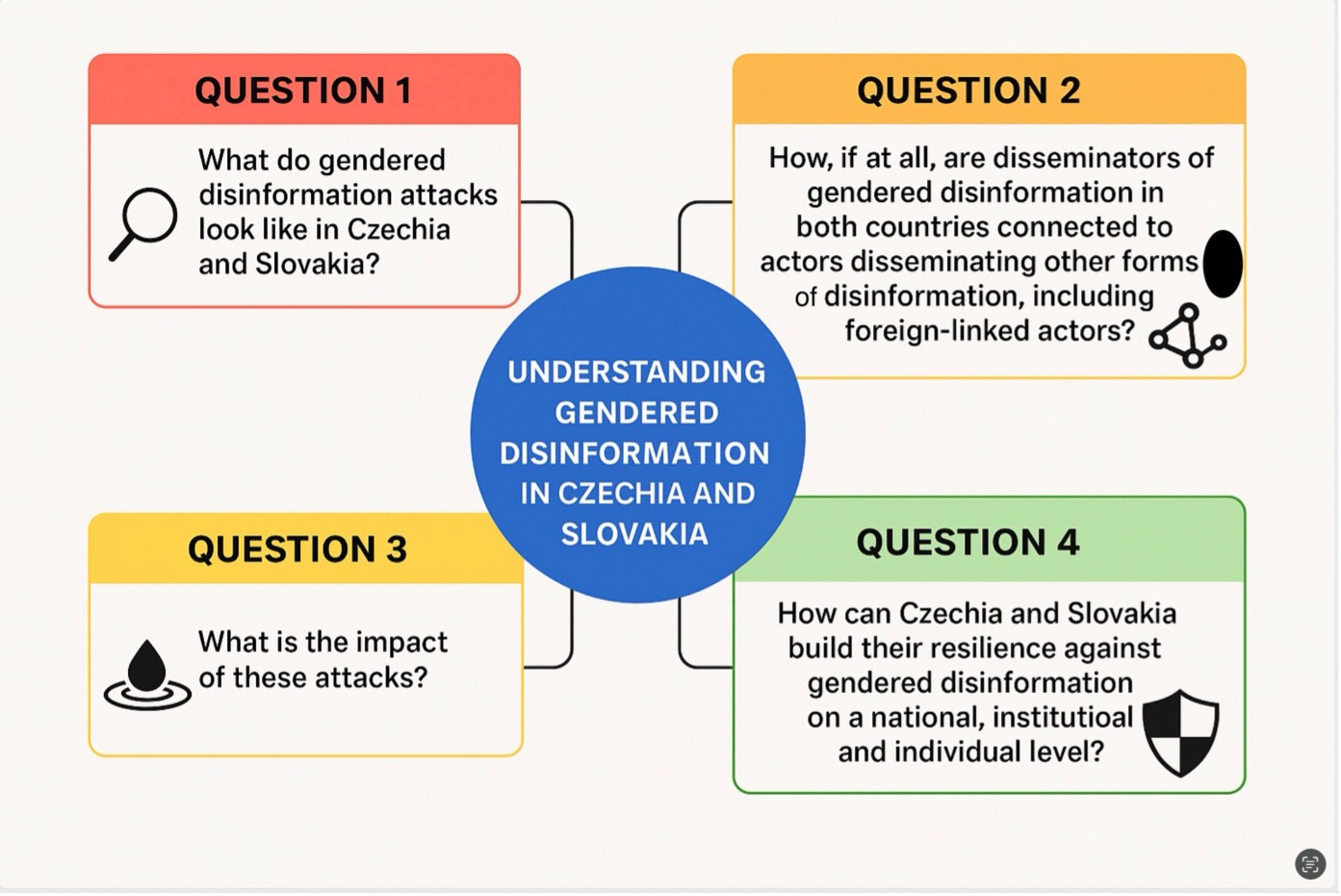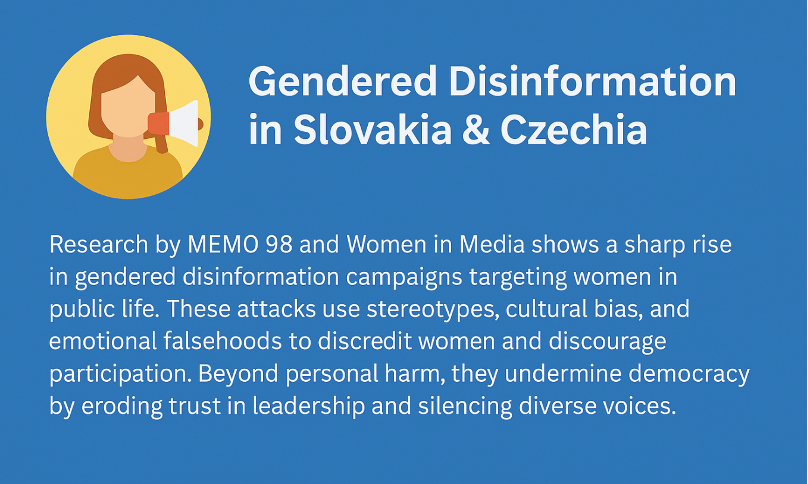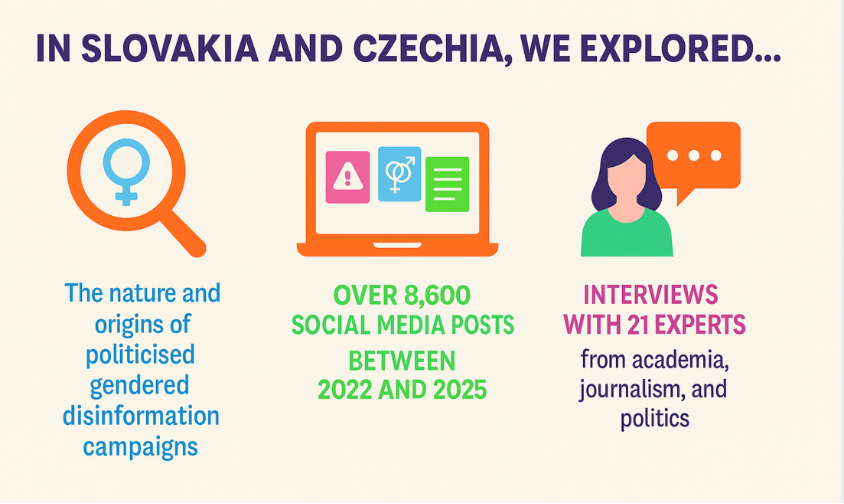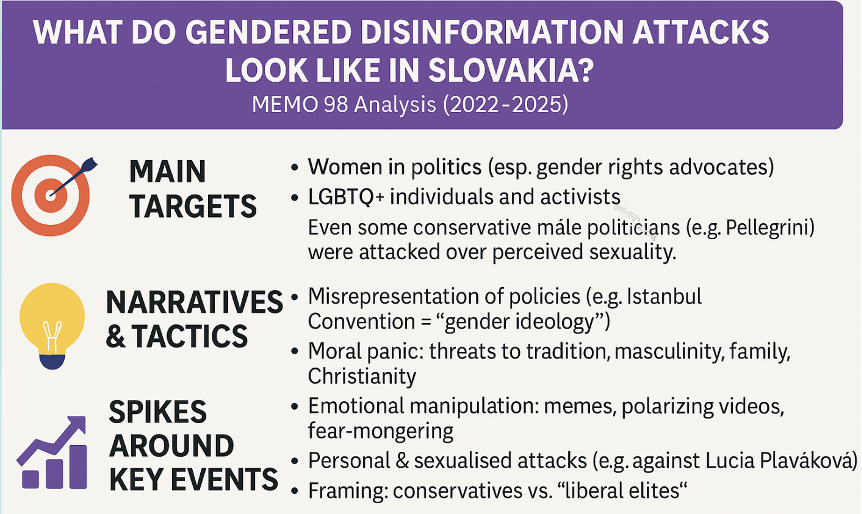
3 minutes
Gendered disinformation in Slovakia and Czechia
From Disinformation to Intimidation: A Comparative Analysis of Gendered Attacks in Slovakia and Czechia
This joint report by MEMO 98 and Women in Media examines how gendered disinformation in Slovakia and Czechia intimidates, polarises, and undermines democracy. It answers four key questions: what these attacks look like, who spreads them (and why), what impact they have—and how we can build resilience at national, institutional, and personal levels.
Gendered disinformation—false or misleading narratives targeting individuals based on their gender or sexual orientation—is an increasingly potent and dangerous feature of the online information space in both Slovakia and Czechia. It undermines democracy, discourages participation in public life, and fuels polarisation.
In this new joint report, MEMO 98 and Women in Media (Ženy v médiích) examined over 8,600 social media posts and conducted 21 interviews with journalists, politicians, activists, and experts—many of whom were personally targeted. The research spans key political moments from 2022 to 2025, including debates around the Istanbul Convention, national elections, and public incidents involving gender equality and LGBTQ+ rights.
The project set out to answer four key questions:

#🔍 What did we find?
#1. A shared pattern of intimidation and polarisation
In both countries, gendered disinformation is used to silence critical voices, particularly women in politics, LGBTQ+ individuals, and those advocating for equality. These attacks rely on misogynistic, homophobic, and transphobic tropes and often escalate during elections or high-profile policy debates.
In Slovakia, mainstream political parties play a central role in spreading such narratives—using dehumanising language, doctored images, and conspiratorial rhetoric. In Czechia, extremist actors are more active, but far-right populist politicians also amplify anti-gender narratives as part of broader anti-EU or anti-Western campaigns.
#2. Disinformation networks are interconnected and transnational
Network analysis shows strong overlap between gendered disinformation actors and pro-Kremlin information sources, especially on Telegram. Several Slovak and Czech accounts—some aligned with Russian or U.S.-based extremist channels—regularly spread content targeting women and LGBTQ+ individuals while also promoting anti-EU, anti-Ukrainian, and conspiratorial narratives.
This reflects a hybrid threat environment, where gendered attacks are embedded in wider campaigns aimed at undermining democratic values and dividing society.
#3. The impacts are profound and long-lasting
Targets of gendered disinformation reported serious consequences, including:
Withdrawal from public life
Anxiety and mental health strain
Reputational damage and lost professional opportunities
Harassment online and offline
Normalisation of misogyny and hate speech in public discourse
Interviewees noted that women from minority backgrounds—Roma, Muslim, LGBTQ+—often face compounded abuse. The cost of public engagement for these individuals is disproportionately high.
#4. Resilience requires a systemic response
The report outlines concrete recommendations for governments, civil society, media, and social platforms. These include:
Stronger content moderation and accountability for platforms
Crisis communication and operational security training for individuals and organisations
Psychological support for targets
Improved digital and media literacy, especially among youth
Cross-party solidarity and higher ethical standards for public figures
Legal and institutional reforms to hold perpetrators accountable
#📄 Download the reports
-
Long-form report 3 MB
This research was conducted as part of a project focusing on gendered disinformation in Slovakia and Czechia, examining its scope, scale, and the networks promoting gendered disinformation narratives.


